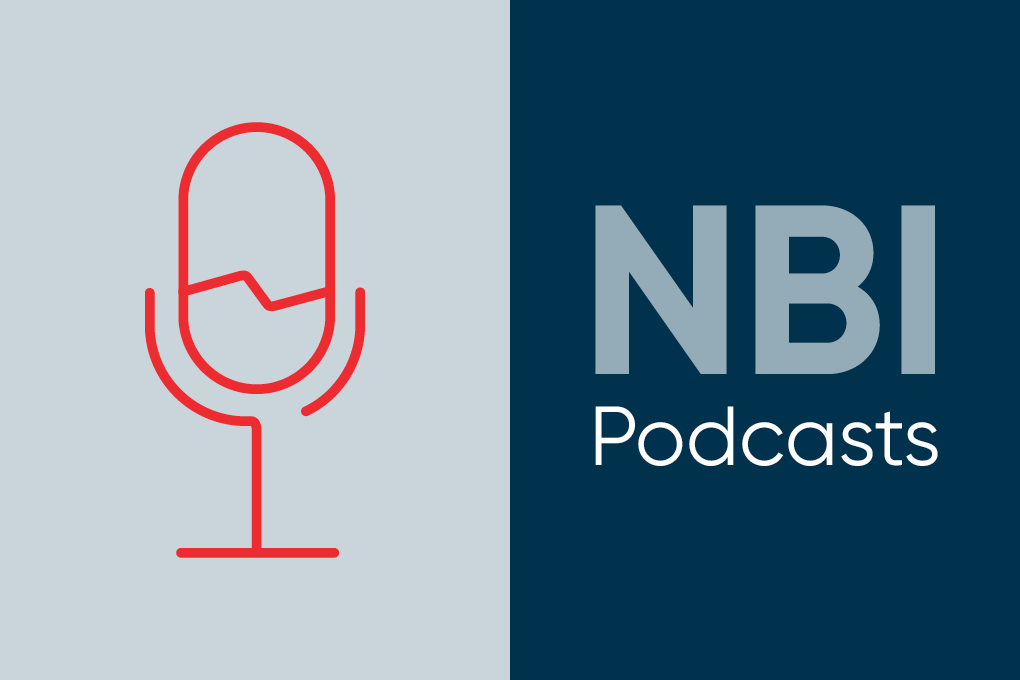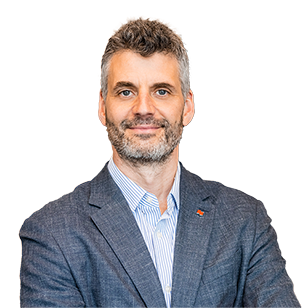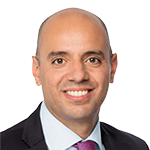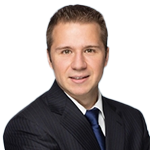Martin Lefebvre
Hi, everyone. I'm Martin Lefebvre, chief investment officer and strategist for National Bank Investments. Welcome and thank you for tuning into our NBI podcast series. Our focus today will be on global small cap investments, its characteristics and where it fits in portfolio construction. And to do so, we have two guests, Nadim Risk and Thomas Horvath. Nadim is founder of Pinestone Asset Management and serves as the firm's CEO, CIO and lead portfolio manager.
He was previously the head of global equity team and the lead portfolio manager of the U.S. international and global equity strategies at Fiera Capital. Mr. Rizk and the global equity team are the proud recipients of multiple awards throughout the years for their global equity fund and U.S. equity fund. Thomas serves as a PineStone's lead portfolio managers for the global small cap strategy. And prior to being promoted, he was the lead analyst for PineStone's large cap investment team.
Mr. Horvath was a founding member of the global equity team at Fiera Capital and has held increasing responsibility for the team since 2009. Gentlemen, welcome and thank you for being with us.
Nadim Rizk
Thank you, good morning.
Thomas Horvath
Morning.
Martin Lefebvre
Yes. So Nadim, why don't we start with you. Could you start off with telling us a little bit about you, about your firm, and how it all started with PineStone Asset Management?
Nadim Rizk
Okay, I don't know how far back you want me to go, but I'll do it quick. I was born in Lebanon many years ago. I came to this country almost 30 years ago to attend McGill, and that's how my story started in Canada. I was very passionate about investing. I was a bit of a stock-rad. I was involved in applied investments, Investment Club, etc. at McGill and so was Thomas. He obviously has the same sort of passionate profile. I had met through Investment Club at McGill back then, the CEO of CN Pension, which had a style of investing that really fit in my interest, which was very, you know, buffet-like. Where you essentially owned a handful of companies that were really special on many levels and you hold on to them as long as the business is performing.
Martin Lefebvre
Was that Pascal Duquette era or?
Nadim Rizk
This was the Pascal Duquette era, exactly. So I was hired by Pascal and also Russ Hyscock, which became head of CN Pension Revenchie. Pascal went to NAC and National, so there's a connection there as well. So this was my official entry into the business and CN was a great school because it was, I think, the place to go to, especially when you're young, to learn. And a lot of that inspired us eventually at Fiera, then here, of sort of doing the same investment schooling that we do here. So we, especially on the investment side, we have a preference for hiring young, passionate graduates. So Thom in 2009 was a fresh grad from Concordia and he had the same sort of, you know, passion and interest in the business. We bring them in and kind of teach them how to invest in our style. We're not saying there's only one style of investing, but that's sort of our style. We find it's a lot easier when there is sort of growth from within on the investment side.
But anyhow, so that's how it started. Eventually, I'll skip a few years, but we made it to Fiera in early 2009. Funny enough, the week when S&P hit a bottom during GFC, and Fiera and us kind of launched the business if you want. It was a bit of a, let's call it a joint venture. The business was started pretty much from scratch. We had a small amount of capital as seed money to launch the business, but it was tiny.
And we built the business organically at Fiera and became incredibly successful, you know, in all modesty, something that we're incredibly proud of because it has either not or hasn't really been done much in Canada or Quebec. So we built a massive institutional business against piece by piece. But we also built it with clients here, clients in the US, in Europe, in the UK and in Asia, which is really something that we're, like I said, incredibly proud of. And the investment style, as I said, from sort of day one, the CN days hasn't changed. So we are, you know, very long term concentrated. We own, we think some of the best of the best ideas and we hold onto them for, you know, 10, 20, whatever years, as long as the business is performing. So that hasn't changed. And in terms of products, we also were, you know, very limited in what we do. I think we do something amazing, but we do something very small, so very narrow. The global smart cap, which we'll talk about a bit later is our more recent product and we haven't launched a new product in over a decade. So it's, you know, this is a very focused investment style. So that's roughly in a nutshell the story. I know you're going to ask about PineStone, so I'll preempt the answer to your question.
So we obviously had a tremendous amount of success with Fiera and we are incredibly proud of what we did together. But we still had this itch of being really a small company, small firm. We wanted to prove to ourselves that we could do it. We wanted to be our own culture, mindset, family, a little different. It was not the result of any issues we had with Fiera or any sort of disagreement. We actually still, you know, Fiera is still a large client for us and we still have a very strong relationship.
But we, on the one hand, had this sort of calling by the heart, if you want. And we wanted to kind of achieve our passion before it was too late. I was in my mid-40s a few years ago. On the other hand, we were a significantly large part of Fiera's business. And so we had this sort of, we were a little torn, if you want. So we wanted to achieve this without essentially impacting the organization that gave us a large chance of succeeding.
So we found a way to make it work. And today we sub-advise a lot of the client assets that we have at Fiera. So Fiera went from being an employer to being a client in a nutshell. That's a strange action we did. And Pinestone was created in March of 2021. So a couple of years now, and we're extremely happy and super excited about what we've built so far and what the future holds.
Thomas Horvath
I applause.
Martin Lefebvre
Yeah, good, good answer. So you started, you said you started at Fiera in 2009. So how big is the business nowadays at PineStone management? How much asset on the management you guys have?
Nadim Rizk
So roughly we're about 45 to 46 billion USD, which is about 62 billion Canadian, depending on currency. Roughly speaking, about 35 billion US is still the legacy business, let's call it that, which we have with Fiera. And about 10 billion is new business that we've raised at Pinestone, which is really amazing. It's actually beyond the… even our most optimistic forecast. So the business is doing really well. We're about 30 employees overall.
Martin Lefebvre
Wow, that's quite an achievement. Congratulations on all of that. Nadim, you've already touched upon your process, but what makes you really different, and how much of that has been a catalyst to your outperformance throughout the past decade or so?
Nadim Rizk
I think we're quite different from a lot of other firms and I think that is a large part of the success we had in the past. I think the success was due to obviously a very specific vision, so we had a very specific vision in how we want to invest.
And we obviously stuck to it in all kinds of markets, whether it was easy, strong markets, or tough 2008, 2009, or COVID, etc. I think that was a big part of the success. I think we have an amazing team, and we do amazing work on being a key part of the team. That's a big part of the success.
It is unique in the sense that firms that invest in a very small subset of the market and hold positions for 10 to 25 years are very rare. As you know, and it has changed a little bit in the last 20 years. So 20 years ago when we started, concentration was actually a big negative for us. Selling into the U.S. market was very hard. Clients that would invest in a global fund that had 20, 30, 40 positions were few and far between. But that's because active firms had 200, 300 positions and the very low cost passive didn't really exist, ETFs didn't really exist. So that has improved a little bit. So today there's more and more concentration and there's also more and more acceptance for concentration.
But buy and hold still in our industry is, you know, one, two, three years. That's typically, you know, if you're holding something for a couple of years, you consider yourself as a long-term investor. And again, like at said, we’re not picking at anybody. There’s a million was to skin a cat, but for us it’s in the best interest of investors, and us, since we’re heavily invested in the strategies as well, to just hold on to a business that’s compounding value over extended periods. And that is, in my opinion, fairly unique in today’s world.
Martin Lefebvre
Okay, let’s talk a little bit about the small cap strategies that we just launched with you guys. Obviously, you’re famous for managing large cap, whether in the US or in global equities. What’s your take on this new find or your approach to managing small cap?
Nadim Rizk
Yeah. So before I hand it over to Thomas with some of the comments. Just keep in mind a few things like I said. We’re not in the business of launching products for the sake of launching products, we want to be an investment firm before, you know, rather than be a product firm. When we launch a new product, we have two conditions that are necessary for us to be promoting a product for investors and potential investors. One is we have to be convinced that we have an edge or an advantage in managing such a product. Like I mentioned on the large cap, we have to ourselves be convinced that we are actually really good or better that average at running such a product, which is I think the case here. It’s not the case for most products out there, but it is the case here. And the condition is we have to believe that this product actually is in the best interest of clients and adds value to clients. And that’s why typically we are willing to significantly co-invest alongside our clients.
I think for small cap, it’s something that obviously checks these two items. It’s also something that we have been looking at for years, actually since the Fiera days, we’ve multiple times considered launching that. It didn’t work for different reasons at Fiera. The timing, etc, there was always something, so we always kind of postponed it. Thom and I spoke about it a few times and I told him, you know, be patient and we’ll do it one day. Luckily, he is patient, that’s why he likes working with us. Eventually we felt like this was the right time. At PineStone obviously, we had a lot more interest in such a product, but we wanted to make sure that the firm was properly set up. You know, back office, compliance, operations, IT, everything was functioning really well before we considered. So now that we’ve been in business for a few years, we felt comfortable. And the Bank was also interested in seeding this strategy at the same time. So, all the pieces, sort of all the stars, were aligned and we felt it was the right time.
Something personal, I would say I think that Thomas is also more that ready. Because again you need all these pieces to be perfect to launch a product that is really in the best interest of clients, versus sort of you know, launching it quicky. It works. If it doesn’t work, we shut it down. We fire everybody and we move on. We take a lot more time deciding on something because we like to do it well.
One final point is also, the way we also did things is different from other firms. So, what we did here is that we worked on the product quietly. We did all the research, all the setup, all the coverage, before we launched the product, which is also something that not typically done. Most firms would actually launch a product, get the money, then do the work. Which is understandable because it is costly in terms of time and money for a firm to actually do the work before the client’s money is in. So, in this case, we started almost a year ago. Kind of behind the scenes, quietly doing all the work. And so the day we launched, we were very comfortable telling clients that you are buying into a product that has full coverage and full confidence from our side that we know what we are investing in.
Martin Lefebvre
All right. So Thomas, turning it over to you. As the lead PM on the Global Small Cap strategy, can you tell the advisors on the line what are, basically, the pros and cons of global small stocks. Whether compared to large cap or, let’s say, US small caps.
Thomas Horvath
Sure. So, there’s a lot of puts and takes you can have when looking at a product like the Global Small Cap. So, in terms of advantages, one of the biggest ones is that a lot of these companies are simply less followed and they’re earlier on in their story. There’s a lot more potential if you understand how to identify high quality businesses. You’re able to find these companies earlier, and then you’re able to own them for even longer and make a lot of return with them.
In addition, since they are earlier in their life cycle, often these companies can grow at a very nice pace for a long period of time. Often what we’ve noticed is that these smaller companies; they’re operating within a specific niche in the market, and they have a very strong positioning. When you look at larger companies, often they’re more diversified and they’re more mature in some of these markets.
And then the last point, I would highlight that the market for global small cap is very large in terms of the breath of companies that are out there. If you look at the index alone, there’s over four thousand companies to chose from, and the largest company in the index is probably ten or twenty basis points. So, you could be very active and have an active strategy and identify a lot of these strong companies. Now on the other side, there’s a few things that you have to manage when you’re running a global small cap fund, and the big one is definitely liquidity.
When we started, it was very rare for any, certainly for any large organizations, to consider themselves as a long-term investor. And so that's a big differentiator. Concentration is a big differentiator. Being long-term is a big differentiator.
And our team is a big differentiator. The fact that we, you know, had a very strong culture at Fiera, which we really enjoyed, the same culture exists here. We, you know, we're still hiring. We actually haven't really grown in size at Pinestone. We've had a tremendous amount of growth. The 30 people that we have today, we are very proud of, and they've all grown with us over the years. So, again, that's the success.
Martin Lefebvre
Excellent. Thomas, could you tell us a little bit about the small cap strategy? How does it fit in your overall philosophy and approach?
Thomas Horvath
Sure. So small caps, as you know, are a part of our overall philosophy. In terms of approach, it's a very natural fit with our concentrated, long-term investing approach. Small caps offer us a lot of opportunities. We're not as constrained by the size of the companies we can invest in. And it allows us to focus on the growth potential that these companies have.
So the small cap strategy fits in our overall philosophy quite well. We look for companies that are not just small in size, but are also positioned to grow significantly over the long term. We want to find companies that have strong competitive advantages, good management teams, and a clear path for growth.
In terms of the approach, we’re looking for companies that are often overlooked by larger investors, which can provide us with an edge. We spend a lot of time doing fundamental research to identify these opportunities, and then we invest with a long-term perspective, much like we do with our larger cap investments.
So, in essence, small cap investing fits into our broader investment philosophy as a way to capture growth potential in companies that have room to expand and create significant value over time.
Martin Lefebvre
Great, thanks Thomas. Nadim, could you talk a little bit about the research process? How does your team go about identifying and evaluating potential investment opportunities, especially within the small cap space?
Nadim Rizk
Sure. The research process is a critical part of our investment philosophy. It’s quite detailed and thorough. Our process starts with a broad screening to identify potential companies that fit our criteria. We look for companies with strong fundamentals, a clear competitive advantage, and a solid growth strategy.
For small caps, we often rely on a combination of quantitative screens and qualitative research. The quantitative screens help us narrow down the universe of small cap stocks to a manageable number, while the qualitative research allows us to dig deeper into the business models, management teams, and industry dynamics.
We do a lot of due diligence, which includes meeting with management teams, visiting facilities, and speaking with industry experts. Our goal is to understand not just the financial metrics, but also the qualitative aspects of the business that can drive long-term success.
Once we identify potential investments, we conduct a deep dive analysis. This includes looking at historical performance, future growth prospects, and potential risks. We also compare these opportunities to our existing portfolio to ensure that we’re building a well-diversified and high-quality portfolio.
Throughout this process, we maintain a long-term perspective and are willing to be patient. We’re looking for companies that can grow and thrive over many years, not just in the short term. This rigorous and thorough research process helps us identify high-quality small cap investments that align with our overall investment strategy.
Martin Lefebvre
Excellent. I guess my next question would be about the challenges of investing in small caps. What are some of the risks and challenges associated with this segment of the market, and how do you mitigate those risks?
Thomas Horvath
Investing in small caps certainly comes with its own set of challenges and risks. Some of the main challenges include lower liquidity compared to large caps, higher volatility, and the potential for less comprehensive financial information.
To mitigate these risks, we take a few key approaches. First, we focus on companies with strong fundamentals and solid management teams. This helps us avoid companies that might be more prone to volatility or financial instability.
Second, we do extensive due diligence and research to ensure that we have a good understanding of the business and its risks. This includes analyzing financial statements, assessing the competitive landscape, and meeting with management teams to gain insights into their strategies and operations.
Third, we maintain a diversified portfolio to spread out the risk. Even though we’re focused on small caps, we still ensure that our portfolio is well-diversified across different sectors and industries. This diversification helps to reduce the impact of any single investment on the overall portfolio.
Lastly, we maintain a long-term investment horizon. Small caps can be more volatile in the short term, but by focusing on the long-term growth potential, we can weather short-term fluctuations and benefit from the long-term value creation of these companies.
Overall, while there are risks associated with small cap investing, our thorough research process, diversification, and long-term focus help us manage and mitigate these risks effectively.
Martin Lefebvre
Great insights. Nadim, do you have any concluding thoughts or final remarks about global small caps and their role in a diversified investment portfolio?
Nadim Rizk
I do. I think global small caps play a very important role in a diversified investment portfolio. They offer significant growth potential, and their characteristics can complement other parts of a portfolio.
Because small caps are often less correlated with large caps and developed markets, they can provide valuable diversification benefits. They also have the potential to generate substantial returns over the long term, especially if you’re investing in high-quality companies with strong growth prospects.
That said, it’s important to approach small cap investing with a clear understanding of the risks involved and a disciplined investment process. By doing so, you can capture the potential benefits of small caps while managing the associated risks.
Overall, small caps can be a valuable addition to a diversified portfolio, providing growth opportunities and diversification that can enhance long-term investment outcomes.
Martin Lefebvre
Well said. I want to thank both of you, Nadim and Thomas, for your valuable insights today. It’s been a pleasure discussing global small caps with you.
Nadim Rizk
Thank you very much.
Thomas Horvath
Thank you.
Martin Lefebvre
And thank you to everyone who tuned in. We hope you found this discussion informative and valuable. Until next time, take care and invest wisely.


 Martin Lefebvre
Martin Lefebvre



